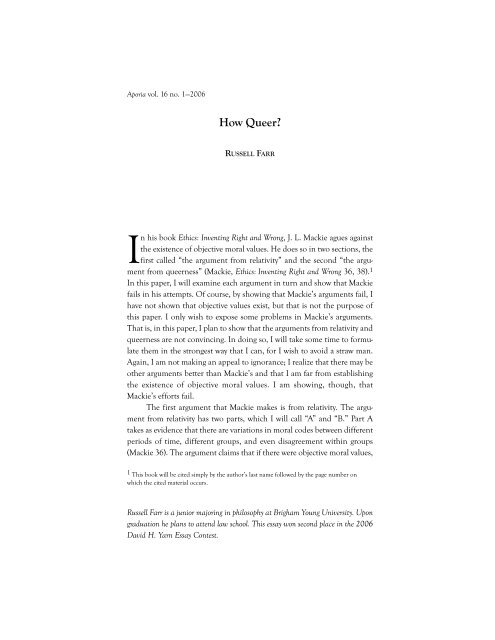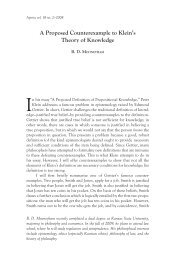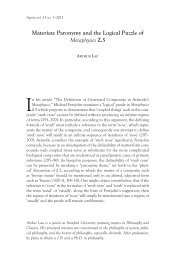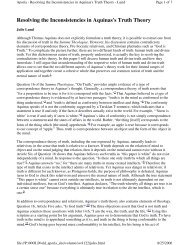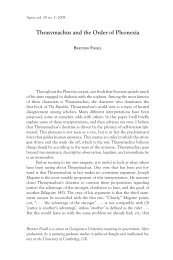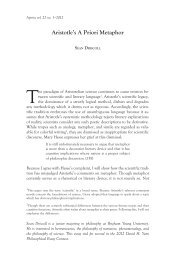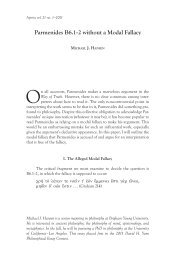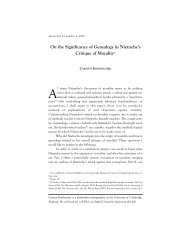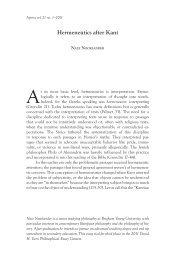How Queer? - Aporia - Brigham Young University
How Queer? - Aporia - Brigham Young University
How Queer? - Aporia - Brigham Young University
Create successful ePaper yourself
Turn your PDF publications into a flip-book with our unique Google optimized e-Paper software.
<strong>Aporia</strong> vol. 16 no. 1—2006<br />
<strong>How</strong> <strong>Queer</strong>?<br />
RUSSELL FARR<br />
In his book Ethics: Inventing Right and Wrong, J. L. Mackie agues against<br />
the existence of objective moral values. He does so in two sections, the<br />
first called “the argument from relativity” and the second “the argument<br />
from queerness” (Mackie, Ethics: Inventing Right and Wrong 36, 38). 1<br />
In this paper, I will examine each argument in turn and show that Mackie<br />
fails in his attempts. Of course, by showing that Mackie’s arguments fail, I<br />
have not shown that objective values exist, but that is not the purpose of<br />
this paper. I only wish to expose some problems in Mackie’s arguments.<br />
That is, in this paper, I plan to show that the arguments from relativity and<br />
queerness are not convincing. In doing so, I will take some time to formulate<br />
them in the strongest way that I can, for I wish to avoid a straw man.<br />
Again, I am not making an appeal to ignorance; I realize that there may be<br />
other arguments better than Mackie’s and that I am far from establishing<br />
the existence of objective moral values. I am showing, though, that<br />
Mackie’s efforts fail.<br />
The first argument that Mackie makes is from relativity. The argument<br />
from relativity has two parts, which I will call “A” and “B.” Part A<br />
takes as evidence that there are variations in moral codes between different<br />
periods of time, different groups, and even disagreement within groups<br />
(Mackie 36). The argument claims that if there were objective moral values,<br />
1 This book will be cited simply by the author’s last name followed by the page number on<br />
which the cited material occurs.<br />
Russell Farr is a junior majoring in philosophy at <strong>Brigham</strong> <strong>Young</strong> <strong>University</strong>. Upon<br />
graduation he plans to attend law school. This essay won second place in the 2006<br />
David H. Yarn Essay Contest.
12 RUSSELL FARR<br />
there would be some consensus on morality because moral systems would<br />
be based on those values. But there is widespread disagreement about<br />
morality, and this is inconsistent with the hypothesis. Therefore, we must<br />
admit that there are no objective moral values. More succinctly, the argument<br />
is as follows:<br />
(1) If there were objective moral values, then there would be<br />
uniformity in moral codes.<br />
(2) Moral codes differ in important ways.<br />
(3) Therefore, there are no objective moral values.<br />
One may object to this argument by showing there is disagreement<br />
in scientific questions, and thus one could analogously say:<br />
(4) If there were objective facts, then scientists would agree<br />
about them.<br />
(5) Scientists disagree about many things.<br />
(6) Therefore, there are no objective facts.<br />
But unless we want to adhere to extreme subjectivism, which is not a doctrine<br />
that Mackie is espousing (see Brink, “Moral Realism and the Skeptical<br />
Arguments from Disagreement and <strong>Queer</strong>ness” 112), we must admit that<br />
(7) Science is discovering objective facts.<br />
So how is it that we can disagree about scientific questions and not end up<br />
with this contradiction? It is because scientific disagreements are the result<br />
of hypotheses that are based on inadequate evidence (Mackie 36). Our<br />
incomplete knowledge causes these disputes, and because we do not have<br />
a complete understanding of the natural world, we cannot assume that we<br />
would agree upon all objective facts. It seems then that Mackie rejects (4)<br />
and avoids the contradiction by claiming that the existence of objective facts
HOW QUEER?<br />
13<br />
does not necessitate our knowledge of them. But Mackie says “it is hardly<br />
plausible to interpret moral disagreement in the same way” (Mackie 36).<br />
In part B, Mackie makes an argument to best explanation and proposes<br />
a theory of how morality actually works. He claims that our morality<br />
is a result of our habits and customs (Mackie 36). For example, we prefer<br />
monogamy because it is the type of thing we do, not because monogamy is<br />
an objective good. We idealize the things that we do and call them objective<br />
values. This theory better explains the variety in moral codes (Mackie 37). If<br />
people in different cultures have different moral values than we do, it is<br />
because they have idealized their behavior, some of which is different than<br />
our own. This theory can adequately explain the wide variety in moral codes,<br />
a variety that causes problems for theories positing objective moral values. 2<br />
The question, though, is whether or not Mackie’s arguments are actually<br />
convincing. If he is trying to demonstrate that there are no objective<br />
moral values, he has a difficult task. There are very few ways of proving that<br />
something does not exist. Either we would have to discover some true conditional<br />
by which we can use modus ponens to arrive at the non-existence of the<br />
thing or we would need to resort to a reductio ad absurdum. Mackie seems to<br />
propose the conditional “if there are objective moral values, there would be<br />
a consensus” and infers there are no objective moral values by modus tollens.<br />
It seems Mackie has made a fatal assumption here. He has assumed<br />
that the existence of objective moral values would force a consensus. I fail<br />
to see why that would be so. What is it about objective moral values that<br />
would force their knowledge upon us? There are many objective truths<br />
that are yet unknown or are disputed by us. For a long time scientists have<br />
debated the makeup of the atom. It cannot be both Thompson’s plum<br />
pudding and an electron orbiting a nucleus. 3 Yet whatever is really the<br />
makeup of the atom, various possibilities have been disputed. Objective<br />
facts have yet to force their knowledge upon us in any other circumstances,<br />
so why should morality be different?<br />
Mackie does try to refute objections that compare moral disagreement<br />
to scientific disagreement, saying that “it is hardly plausible to<br />
2 Mackie treats a theory by Sidgwick that proposes to overcome the difficulty while maintaining<br />
objective values (Mackie 37), but this is not relevant to my discussion.<br />
3 The current model is an electron probability cloud surrounding a nucleus.
14 RUSSELL FARR<br />
interpret moral disagreement in the same way” (Mackie 36). But he gives<br />
no other reason to believe this than his assertion. Scientific pursuits can<br />
avoid this problem because the disputes are based on inadequate knowledge.<br />
Yet moral disagreements could come about the same way. The key to<br />
Mackie’s refutation of the counterexample is knowledge. Because objective<br />
facts do not cause us to know them, we must search for knowledge; in that<br />
search we often err. But, in order to conclude that moral systems cannot<br />
avoid this problem in the same way scientific disputes do, we must assume<br />
that all people know these objective moral values equally well. This assumption<br />
has little in the way of justification.<br />
If there are objective moral values, we have no reason to suppose that<br />
all people know them equally well, and so we can expect some disagreements<br />
about morality. These disagreements would be based on one or both<br />
disagreeing parties’ faulty understanding of what the true objective moral<br />
values are. To give an example with a strongly moral aspect, let us look at<br />
the Qur’an. The Qur’an is a book containing codes of conduct that a faithful<br />
Muslim must observe, yet those who call themselves devout Muslims<br />
range from the peaceful Sufi mystics to the Jihadists. Both of these groups<br />
read the same book and get wildly different meanings from it. So, even<br />
when the law is written down and easily accessible to all, people will interpret<br />
it differently. If we cannot agree upon moral codes that are written for<br />
all to see, I do not see how we are justified in assuming that everyone<br />
must know and understand an unwritten moral code equally well.<br />
Therefore, we can reject (1) and can thereby demonstrate that Mackie has<br />
not adequately supported (3).<br />
Even supposing that there was an objective value that was known<br />
equally well by two parties and that those parties in someway disagreed<br />
about it, this would only show that one of the parties failed to implement<br />
it correctly or that this particular supposedly objective value indeed does<br />
not exist. Disagreement cannot show that the whole set of objective moral<br />
values does not exist, only that one or more value supposedly in the set<br />
does not exist. Such is the fate of arguments of this type, for example, the<br />
related arguments dealing with the problem of evil. If they are sound, they do<br />
not show that God does not exist but that a being with all the properties of<br />
the Absolute cannot exist. There is a possibility that Mackie’s argument
HOW QUEER?<br />
15<br />
could show that some certain moral value or values do not exist, but even<br />
this allows too much. Disagreement as it stands may be explained by<br />
human error in our efforts to understand exactly what the objective moral<br />
values really are.<br />
Richard T. Garner asserts that Mackie makes no attempt to show that<br />
objective values do not exist by such an argument as the one refuted above;<br />
instead, he claims that Mackie’s argument is an argument to best explanation<br />
(Garner, “On the Genuine <strong>Queer</strong>ness of Moral Properties and Facts”<br />
140). I will now examine this version, which I have previously called “B,”<br />
but I should note that even if Mackie’s theory best explained our moral systems,<br />
it would not show that there are no objective values; it would only<br />
show that those are not the sort of thing that all people base their morality<br />
on. I say “all” because this disagreement does not exclude the possibility<br />
that some groups may base their morality on objective values.<br />
This version of the argument makes the assumption that there is vast<br />
disagreement among moral codes, this being the anomaly that Mackie’s<br />
moral theory explains better. If there were no vast disagreement, then the<br />
subjectivist would have to explain how so many societies came to behave in<br />
such incredibly similar ways and then idealize those behaviors. Merely mild<br />
disagreement does not show that there are no objective moral values<br />
because objective moral values would help explain the almost overwhelming<br />
consensus of the world’s people. The disagreement among peoples must be<br />
vast enough that it actually counts against the objectivity of values. But<br />
those who make this argument have severely overestimated the level of<br />
disagreement in the world.<br />
Even our moral disagreements rest on a foundation of broad moral<br />
agreement. For example, in the ongoing debate about abortion no one<br />
questions whether it is right or wrong to kill people. Pro-choice advocates<br />
do not condone murder. The questions they raise are about whether a fetus<br />
is a person with a right to life. In other disagreements, only some aspect of<br />
an objective moral value is questioned. For example, death penalty proponents<br />
and opponents do not disagree about whether killing people is<br />
morally wrong; the issue is whether it is morally justified, or even required,<br />
in the case of extreme criminals. Even Jihadists appeal to values with which<br />
we can identify. They indiscriminately kill because they truly believe the
16 RUSSELL FARR<br />
West is trying to destroy their people, culture, and religion. We disagree with<br />
their assessment and their methods, but we do not disagree that people<br />
should protect their people, culture, and religion. We may argue with them<br />
to try and convince them that non-violent methods are more appropriate,<br />
but we can identify with their love of their own society. Even sadists appeal<br />
to values we can understand. They inflict pain on others because it gives<br />
them pleasure. We understand why a sadist values pleasure because we<br />
value it ourselves. We non-sadists simply disagree with how the person<br />
achieves such pleasures and would say that the sadist values pleasure<br />
above more important values. We can see that the questions in many of<br />
these disagreements are either about facts or about which moral values<br />
have preeminence, not about two utterly foreign moral values.<br />
That we can even communicate about moral values with people<br />
whose moral codes clash with our own shows some consensus. Those who<br />
have differing moral codes will always justify their practices with a value we<br />
can understand. Once we realize this, Mackie’s claim to have the better<br />
explanation falters. Did people from separate communities all across the<br />
world independently happen to behave in ways that led them to idealize<br />
nearly all of the same values that all other peoples also idealized? Or is this<br />
agreement explained better by the theory that there is something about<br />
these values that draw all peoples? The disagreements are too few and the<br />
consensus is too wide for us to easily accept Mackie’s theory.<br />
Mackie also argues against objective moral values by discussing their<br />
“queerness,” claiming that objective moral values would be unacceptably<br />
queer both metaphysically and epistemically (Mackie 38). Whatever kinds<br />
of things objective moral values are, they would have to be very strange<br />
entities, so strange that we could not bear it. His metaphysical argument<br />
seems to be:<br />
(8) If there were objective values, they would be unacceptably<br />
queer.<br />
(9) Whatever would be unacceptably queer cannot exist.<br />
From lines 8 and 9 we can deduce:<br />
(10) There are no objective values.
HOW QUEER?<br />
17<br />
The epistemic argument claims that coming to know what objective<br />
moral values are and understanding their authoritative prescriptivity would<br />
require some special faculty. Whatever sensory perception is necessary to<br />
know these objective values would be unacceptably queer. Thus, we can<br />
conclude that we cannot know objective values by an argument similar to<br />
the one above.<br />
Now we ask whether Mackie argues that there are no objective values<br />
at all or that there simply are no objective moral values. If he is claiming<br />
that there are no objective values whatsoever, we must ask by what standard<br />
he can judge moral values as strange. If there were no objective values, such<br />
as aesthetic values, then any standard by which we judge moral values<br />
would have to be completely subjective. And we should ask why we must<br />
choose the subjective standards that label moral values unacceptably queer.<br />
Just as we can freely choose any moral values to live by if there are no objective<br />
values, we can freely choose the standards by which we judge the queerness<br />
of objective moral values. And those standards might not label moral<br />
values as queer. In fact, we could claim that objective moral values are the<br />
only things in the universe that are not unacceptably queer, or that a universe<br />
without objective moral values is unacceptably queer. Therefore, if<br />
there are no objective values at all, we can claim objective moral values are<br />
not unacceptably queer.<br />
If Mackie claims that there are some objective values, namely aesthetic<br />
values, and by these values we could objectively say moral values are<br />
too queer, then we could propose that objective moral values are of the<br />
same kind as the aesthetic values. Moral values would be of a similar type<br />
to the other objective values, and we could know moral values through the<br />
same faculty by which we know the other objective values. Therefore, if<br />
there are some objective values, we can claim that objective moral values<br />
are not unacceptably queer. And because the law of excluded middle dictates<br />
that either “there are no objective values” or “there are at least some<br />
object values” is true, we can claim that objective moral values are not unacceptably<br />
queer. That is:<br />
(11) If there are no objective values, objective moral values are<br />
not unacceptably queer.
18 RUSSELL FARR<br />
(12) If there are at least some objective values, then objective<br />
moral values are not unacceptably queer.<br />
(13) There are either no objective values or there are at least<br />
some objective values.<br />
(14) Therefore, objective moral values are not unacceptably<br />
queer.<br />
And so, even if we grant Mackie’s assumption that nothing unacceptably<br />
queer exists, we need not conclude that objective moral values do not exist.<br />
Finally, that Mackie finds objective values too strange for comfort<br />
seems an odd argument against their existence. I find electrons to be very<br />
strange. The idea that something can be both a wave and a particle and that<br />
it exists as a definite cloud of probabily until a measurement collapses its<br />
wave function is a very strange notion indeed! If I find some idea strange,<br />
does that count in any way against its truth? Certainly not! Moreover,<br />
Mackie finds objective values unacceptably strange because he construes<br />
them so. He claims that objective values would have to be Platonic Forms—<br />
such Platonic Forms would be strange to be sure, but they are not what<br />
many objectivists claim these values are.<br />
When we are confronted with arguments of this type, we need to<br />
examine the assumptions underlying them. Mackie’s assumptions, that<br />
objective moral values would force a consensus and that objective moral<br />
values would be unacceptably queer, are unfounded. Thus, while I have not<br />
shown that there are objective morals, I have shown that Mackie’s arguments<br />
from relativity and queerness fail to persuade us that objective moral<br />
values do not exist.
Works Cited<br />
Brink, David O. “Moral Realism and the Skeptical Arguments from<br />
Disagreement and <strong>Queer</strong>ness.” Australasian Journal of Philosophy<br />
62.2 (1984): 111–25.<br />
Garner, Richard T. “On the Genuine <strong>Queer</strong>ness of Moral Properties<br />
and Facts.” Australasian Journal of Philosophy 68.2 (1990): 137–46.<br />
Mackie, J. L. Ethics: Inventing Right and Wrong. New York: Penguin Books,<br />
1997.


